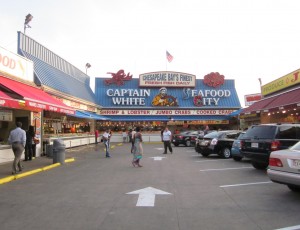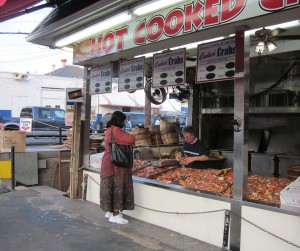11 Catt. 3: In re Maine Avenue Fish Market (The Wharf)
CATTLEYA, J., delivered the opinion of the Cart. JEREMY, C.J., dissented.
Today we decide the case of the Maine Avenue Fish Market, known to locals as the Wharf. At this open air market located on the Southwest Waterfront, vendors sell fresh and cooked-to-order seafood from floating barges along the pier. The sole issue before us is whether the Supreme Cart has jurisdiction over seafood sold at the Wharf.

Maine Avenue Fish Market (a.k.a. The Wharf)
The Judiciary Act of 2011 (Cartiorari Act) grants the Supreme Cart “exclusive jurisdiction of all food carts, trucks, and other transitory alimentary establishments.” Our Rule of Procedure 1-2 states that “[t]he jurisdiction of the Cart shall extend to all mobile gastronomic enterprises situated throughout those parts of (a) the County of Arlington, Virginia, (b) the District of Columbia, and (c) the City of Alexandria, Virginia, which are reasonably proximate to public transportation of a reasonably rapid and efficient character.”

Floating Barge Vendor
Do the Wharf’s floating barges constitute “transitory alimentary establishments” or “mobile gastronomic enterprises”? In our first jurisdictional opinion, In re China Garden, 5 Catt. 1 (2012), we interpreted the term “mobile gastronomic enterprises” and held that the “enterprise[]” itself had to be “mobile,” not just the “gastronom[y].” We affirmed this interpretation in In re Dippin’ Dots, 10 Catt. 5 (2012). Thus, the Supreme Cart had jurisdiction over an ice cream pushcart because both its gastronomy (ice cream) and enterprise (food cart franchisee) were moveable. Dippin’ Dots, 10 Catt. 5. But we did not have jurisdiction over a dim sum pushcart even though its gastronomy (dim sum) was mobile because the enterprise (brick-and-mortar Chinese restaurant) was not mobile. China Garden, 5 Catt. 1.
To resolve the issue before the Cart, we must determine (1) whether the Wharf’s gastronomy is mobile and (2) whether its enterprise is mobile. If either is immobile, then this Cart does not have jurisdiction over the case since the Wharf would not be a “mobile gastronomic enterprise.”

Permanently Docked Barge
On the second question, the Cart finds that the Wharf’s enterprise is not mobile. It is true that vendors at the Wharf sell seafood from barges that float in the water along the pier and that the barges could be capable of moving. This appears to render the Wharf’s enterprise “mobile,” but such an appearance is misleading. The barges are affixed to the pier. They have been permanently docked and thus are effectively immobile. Therefore, the Wharf’s enterprise is not mobile and the Wharf does not satisfy this requirement of a “mobile gastronomic enterprise.”
Because the Wharf’s enterprise is not mobile, it is unnecessary to consider the first question of whether its gastronomy is mobile. Both must be met for the Cart to have jurisdiction, and since one is not met, I decline to consider the other for the sake of judicial economy.
I reiterate that the only issue before us is whether the Cart has jurisdiction over the Wharf. Having found that we do not, we cannot consider any issues relating to the merits of the Wharf’s gastronomy, which includes seafood like shrimp, crabs, and oysters. I urge the Chief Justice to stand strong against any temptation to address any issues beyond the jurisdictional question. I remind him of Judge Henry J. Friendly’s wise words:
A judge’s power to bind is limited to the issue that is before him; he cannot transmute dictum into decision by waving a wand and uttering the word “hold.”
United States v. Rubin, 609 F.2d 51, 69 (2d Cir. 1979) (Friendly, J., concurring).
Chief Justice, please put your wand away in this case.
DISMISSED.
JEREMY, C.J., dissenting.
We have before us a case of vehicles in the park. In 1958, a great debate raged in the pages of the Harvard Law Review. Mr. H.L.A. Hart, defender of legal positivism, imagined a legal rule forbidding “vehicles in the park.” H.L.A. Hart, Positivism and the Separation of Law and Morals, 71 HARV. L. REV. 593, 607 (1958). Clearly this legal rule would bar automobiles, says Professor Hart, but what of bicycles, roller skates, and toy automobiles? Id. Professor Hart posited a core of meaning and penumbrae of “debatable cases.” Id. Mr. Lon Fuller, devil’s advocate for legal realism, asked in response: “What would Professor Hart say if some local patriots wanted to mount on a pedestal in the park a truck used in World War II, while other citizens, regarding the proposed memorial as an eyesore, support their stand by the ‘no vehicle’ rule?” Lon L. Fuller, Positivism and Fidelity to Law—A Reply to Professor Hart, 71 HARV. L. REV. 630, 663 (1958). What would Justice Cattleya say? And so I ask, o Justice Cattleya, must a “mobile gastronomic enterprise,” though it retains the potential for mobility, lose its exalted status merely because it is tethered indefinitely. At what point, then, would a food truck parked at K and Connecticut cease to be “mobile”? A day? A week? A month? A year? My sister—she of the bright lines, see In re Sang on Wheels, 11 Catt. 2 (2012) (Cattleya, J., dissenting)—once again exposes her inconsistencies. I would not dismiss this case, not for all the steamed and seasoned crabs in the Chesapeake Bay.
Reporter’s Note: The dissenting opinion was not included in the first publication and was added on October 24, 2012 due to the Chief Justice’s failure to meet the publication deadline.

Comments are closed.